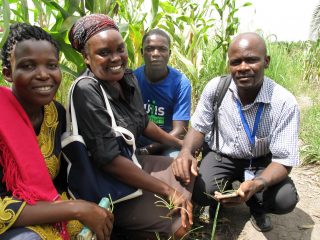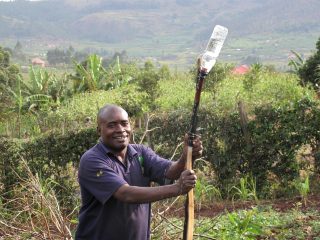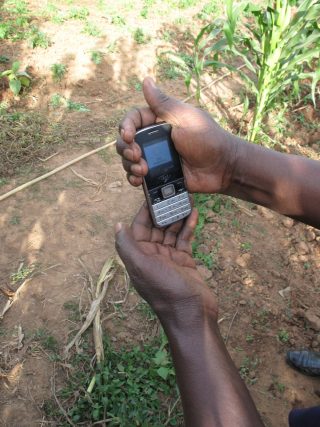Two-thirds of the population in Africa are employed in agriculture, with the vast majority being smallholder farmers. Agriculture could provide one of the best pathways out of poverty, but many farmers lack the knowledge and means to improve their farming practices. However, digital technologies are beginning to change this.
Last year, the Nertherlands-based Technical Centre for Agricultural and Rural Cooperation (CTA), invited me to visit a series of projects in Uganda and Kenya which are helping to transform farmers’ lives. All of them, in one way or another, are benefiting from the use of digital technologies. As Michael Hailu, the director of CTA, points out in his foreword to the latest booklet in CTA’s ‘Stories from the Field’ series – How Farmers Are Making the Most of Digital Technologies in East Africa – timely access to data and information, often via mobile phones, is helping to significantly boost farm productivity and encourage more sustainable resource use.

Farmer Robinah Najjama with three MUIIS service agents
You can download the booklet from CTA’s website, but just to give you a taste of what it’s about here is a summary of the introduction:
This booklet highlights four success stories – three from Uganda and one from Kenya – which illustrate the various ways in which information and communication technologies (ICTs) can help farmers to increase their productivity and incomes. In each case, CTA has provided financial and technical support and established a close working relationship with its partners on the ground.
The first chapter tells the story of a project managed by the Women of Uganda Network (WOUGNET). The Enhancing Access to Agricultural Information (EAAI) project in Apac District used radio programmes and mobile phones to tackle the problems of low productivity and poverty. Although it ended seven years ago, women farmers still refer to it as “the CTA project”. It helped to bring about a threefold increase in crop yields for many women and a significant increase in incomes. Most of the women who benefited from the project will tell you that it also made them more assertive in their dealings with men.
The Market-led, User-owned ICT4Agenabled Information Service (MUIIS), which is the subject of the second chapter, is a hugely ambitious project which is harnessing the power of ICTs to help farmers increase their productivity. “MUIIS is a business, not just a development project,” explains project manager Carol Kakooza. MUIIS aims to increase the crop yields of 200,000 farmers by 25%. Almost 200 service agents have been profiling farmers and encouraging them to sign up to a service bundle which provides them with agronomic tips, weather alerts and index-based insurance, all delivered by text to mobile phones.

Charles Kwehanganu, one of many farmers to benefit from a new cloud-based money management platform
The next two chapters focus on the activities of two organisations – one in Uganda and one in Kenya – which benefited from their participation in a CTA regional hackathon, a competition which enables young computer programmers to showcase their skills and develop new products. Both organisations have developed mobile platforms which have enabled smallholder farmers to gain access to credit – something which most were unable to do in the past.
In Uganda, Ensibuuko, the winner of CTA’s first regional hackathon, held in Rwanda in 2013, has revolutionised the process of applying for and receiving loans by introducing a new cloud-based storage and management platform. This has been used by over 60 Savings and Credit Cooperative Organisations (SACCOs). SACCO members, most of whom are farmers, can now use their mobile phones to save or withdraw money and get loans.
In Kenya, FarmDrive, an organisation established by two young women – most of the key players in this booklet are young – has developed a technology platform which enables farmers to build a credit profile by keeping records of their daily transactions and activities. These can be used by financial institutions to assess creditworthiness. The system also uses a wide range of datasets related to rainfall, soil type and proximity to infrastructure to build credit scores for farmers who have signed up to the platform.

Mobile phones are now as indispensable as hoes for many farmers.
The final chapter describes the importance of innovation hubs. Since 2013, CTA has worked with over 20 different hubs in Africa and the Caribbean. The hubs help start-up companies develop their skills and take off commercially. Two of the hubs, Outbox and m:lab East Africa, whose stories are told in this booklet, played a vitally important role in helping Ensibuuko and FarmDrive develop their businesses.
You can download the booklet here.
CTA is a joint international institution of the African, Caribbean and Pacific (ACP) group of states in the European Union (EU).